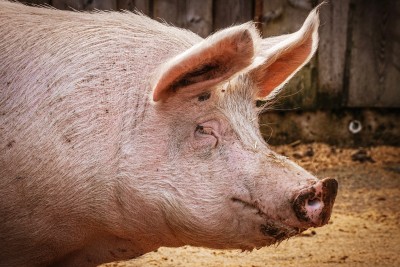Is Your Farm Ready to Prevent a Foreign Animal Disease?
Amy Barkley, Livestock Specialist
Southwest New York Dairy, Livestock and Field Crops Program

Is Your Farm Ready to Prevent a Foreign Animal Disease?
Nancy Glazier, CCE NWNY Dairy, Livestock & Field Crops Team
In late July an outbreak of African Swine Fever (ASF) was reported in the Dominican Republic in backyard pigs. Though ASF has been around for well over 100 years, this is its first appearance in nearly 40 years in the Western Hemisphere, according to the National Pork Producers Council. The disease has decimated many herds in Asia and Europe, as well as Africa where it is endemic.
At this time, it is unknown how it made the jump to the Dominican Republic, an island country. Many outbreaks were reportedly started with direct contact with feral pigs. Parts of Eastern Europe are dealing with outbreaks in wild boars. Large hunts have been approved in an attempt to control and prevent further spread to domestic pigs. The highly contagious disease can be spread through direct contact from pig to pig as well as indirect contact through contaminated equipment, feed, visitors, and employees. It is not transmissible to humans or other animals and is not a food safety issue.
African Swine Fever can spread quickly through herds; be familiar with signs of ASF:
- High fever
- Decreased appetite and weakness
- Red, blotchy skin or skin lesions
- Diarrhea and vomiting
- Coughing and difficulty breathing
There is no commercial vaccine available, though significant development is underway. Control is total herd depopulation of an operation to prevent further spread.
There are now tightened border controls at the US, Canadian, and Mexican borders. Travelers are screened entering the US on direct flights from the Dominican Republic. USDA is pursuing a protection zone in Puerto Rico to maintain the export market if ASF is detected in Puerto Rico.
If there were ever a foreign animal disease outbreak of any kind, quarantines would be established around the property for a specified radius. If your farm was in that area, you would not be allowed to ship animals, milk, or animal products out of the quarantine unless you had a continuity of business plan in place ahead of the outbreak. There are many resources that can be found here for swine if ASF is detected: https://www.securepork.org/. There is also information specific for outdoor production. Resources were developed through a collaboration between the swine industry, state and federal government officials, Iowa State University, and the University of Minnesota.
Biosecurity practices to be mindful of are good to prevent any disease outbreak.
- Make sure visitors have clean clothing and footwear when entering your property.
- Use proper disinfectants
- Limit outdoor exposure of domestic pigs to any feral hogs
- Control insects in and around operations
- Don't feed uncooked garbage, animal tissues, or waste products
We have seen during the pandemic how quickly viruses can spread. Farms of all sizes and production methods need to be mindful of biosecurity measures on their operations. If you want more information on biosecurity, please reach out to your local Cornell Cooperative Extension office. Just about every species has a checklist to assist with biosecurity, continuity of business plan, and ensure a safe food supply.
Upcoming Events
WNY Pastureland Conversion & Soil Health Field Day
July 16, 2025
Middleport, NY
Join American Farmland Trust for the Western New York Soil Health Field Day on July 16, 2025, at Zeliff Farm in Middleport, NY, from 9:00 AM-3:15 PM. Learn about pasture conversion, soil health benchmarking, biochar in grazing systems, and best grazing practices. Plus, enjoy hands-on demos with the NY Soil Health Trailer, drones, and cover crops! Check out the attached agenda for more information about the field day and REGISTER HERE. Zeliff Farms is a regenerative beef operation who has recently partnered with AFT on outreach and education to farmers including learning circles and evaluating biochar effects on soil health.
IPM Strategies to Protect Corn and Soybean Seed in NY
July 30, 2025
Hamburg , NY
SWNYDLFC and Cornell IPM are hosting a grower meeting to discuss integrated pest management strategies for protecting corn and soybean seed in New York.
FAMACHA Training for Sheep and Goat producers in Woodhull NY
August 13, 2025 : FAMACHA Training in Woodhull
Woodhull, NY
Join us for a discussion and hands-on training for internal parasite integrated pest management in sheep and goats. Certification is available to all students participating in the workshop.
Announcements
No announcements at this time.





